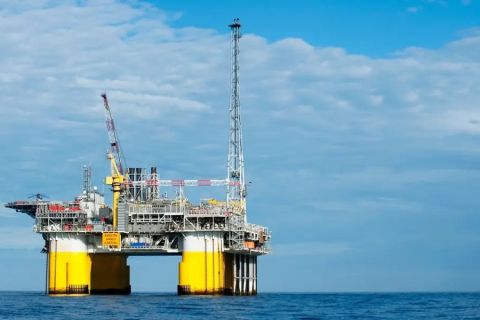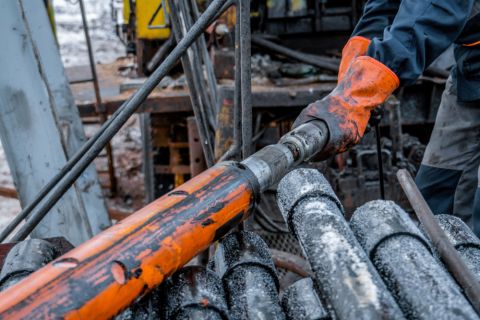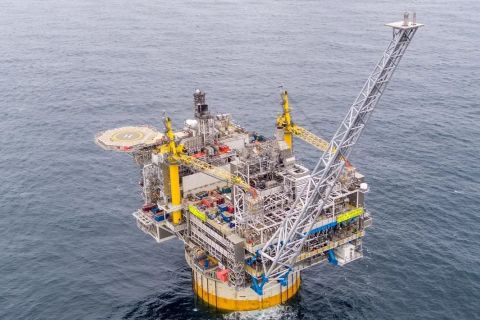Presented by:
Subscribe to receive notifications about new Energy Policy Watch episodes.
Oklahoma was named one of the top two states in 2021 for oil and gas investment. Oklahoma Gov. Kevin Stitt recently joined Cornerstone’s Jack Belcher on the latest installment of Energy Policy Watch to discuss why Oklahoma is the right place to drill, why he’s a strong supporter of the state’s oil and gas industry and the state’s role in the energy transition.
“We’re very fortunate to have oil and gas in our state,” Stitt told Belcher.
“Everywhere you go in Oklahoma, we’re proud of our oil and gas industry,” he continued. “The first oil well was struck in 1897—that was 10 years before statehood. Then we invented fracking—Halliburton, Duncan, Oklahoma, 1947. Then our energy pioneers, we perfected it in the late nineties and 2000s and created this energy independence for Americans.”
A big part of the challenges the U.S. is currently facing has to do with energy supply, which oil-producing states like Oklahoma could help address. Stitt sent a letter to President Joe Biden on March 1 asking the president to help the country boost production to meet its energy needs as well as U.S. allies.
“The Russian invasion of Ukraine is really highlighting the need to supply the needs that we have in our own communities in our own country not only for security but just to get to work,” he noted.
The federal government, according to Stitt, needs to start having honest conversations about energy supply and open up development of projects, like natural gas pipelines, that would help boost production and U.S. energy independence.
“Since 1973, every single administration—Republican or Democrat—has had an energy independence policy,” he said. “Since President Nixon’s OPEC embargo and until this administration. And they’re taking just a hard left-turn and they’re not being honest because the demand is there.”
“Demand has not changed,” he added. “The only thing they’ve done is they’ve choked off supply.”
In addition to discussing how Oklahoma has reduced its CO₂ emissions from the power sector while still being a major oil-producing state, Stitt also spoke about testifying before congress in 2019 about pipeline development in hopes of providing “clean-burning natural gas” production in his state to the East Coast.
“We know the safest way to move natural gas is through pipelines,” he said. “And we know Oklahoma is the pipeline capital of the world and yet we have some of the cleanest air, cleanest water in the country.”
See below for more on this dynamic discussion between Stitt and Cornerstone’s Jack Belcher on the latest installment of Energy Policy Watch including Oklahoma’s hydrogen energy ambitions.
Jump to a topic:
- 1:30 — Oklahoma’s business advantages
- 3:40 — Oil and gas investment
- 5:25 — Biden administration’s energy policy
- 8:15 — Lowering Oklahoma’s emissions
- 10:05 — Hydrogen hub project
- 12:35 — Oklahoma’s role in the energy transition
- 15:40 — Entrepreneurial background
Energy Policy Watch is a partnership between Hart Energy and Cornerstone to bring regular video updates on legislative and regulatory actions affecting the energy industry. Guests range from key representatives or congressional staff to relevant cabinet-level officials and executive branch personnel. View More Energy Policy Watch Episodes Here.
Recommended Reading
TGS, SLB to Conduct Engagement Phase 5 in GoM
2024-02-05 - TGS and SLB’s seventh program within the joint venture involves the acquisition of 157 Outer Continental Shelf blocks.
2023-2025 Subsea Tieback Round-Up
2024-02-06 - Here's a look at subsea tieback projects across the globe. The first in a two-part series, this report highlights some of the subsea tiebacks scheduled to be online by 2025.
StimStixx, Hunting Titan Partner on Well Perforation, Acidizing
2024-02-07 - The strategic partnership between StimStixx Technologies and Hunting Titan will increase well treatments and reduce costs, the companies said.
Tech Trends: QYSEA’s Artificially Intelligent Underwater Additions
2024-02-13 - Using their AI underwater image filtering algorithm, the QYSEA AI Diver Tracking allows the FIFISH ROV to identify a diver's movements and conducts real-time automatic analysis.
Subsea Tieback Round-Up, 2026 and Beyond
2024-02-13 - The second in a two-part series, this report on subsea tiebacks looks at some of the projects around the world scheduled to come online in 2026 or later.






